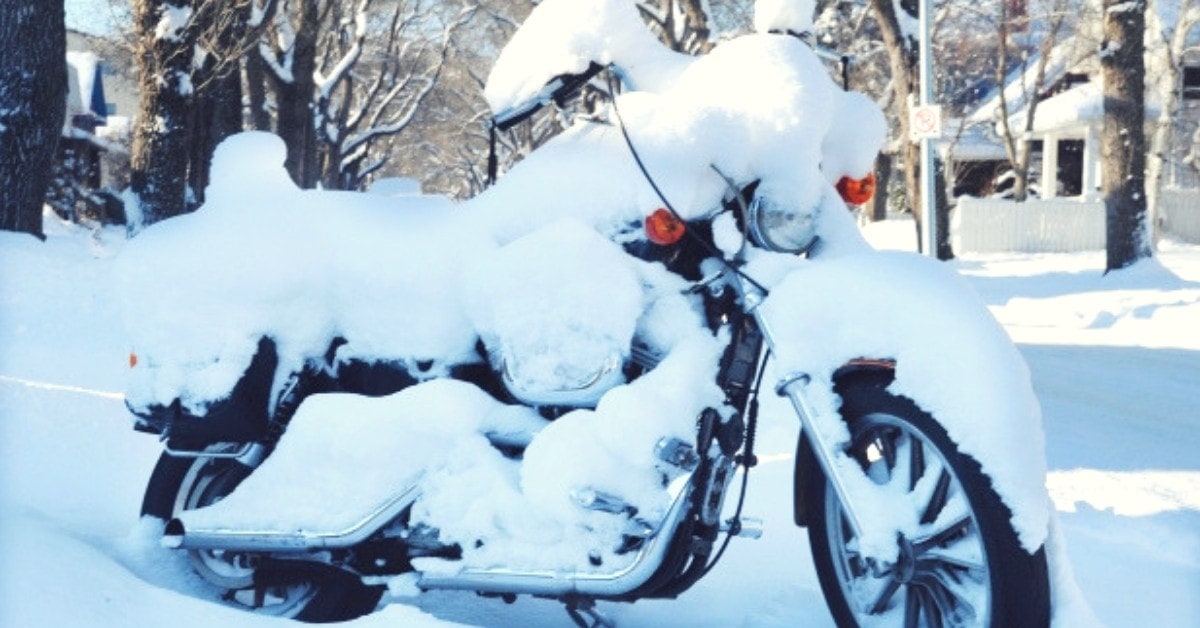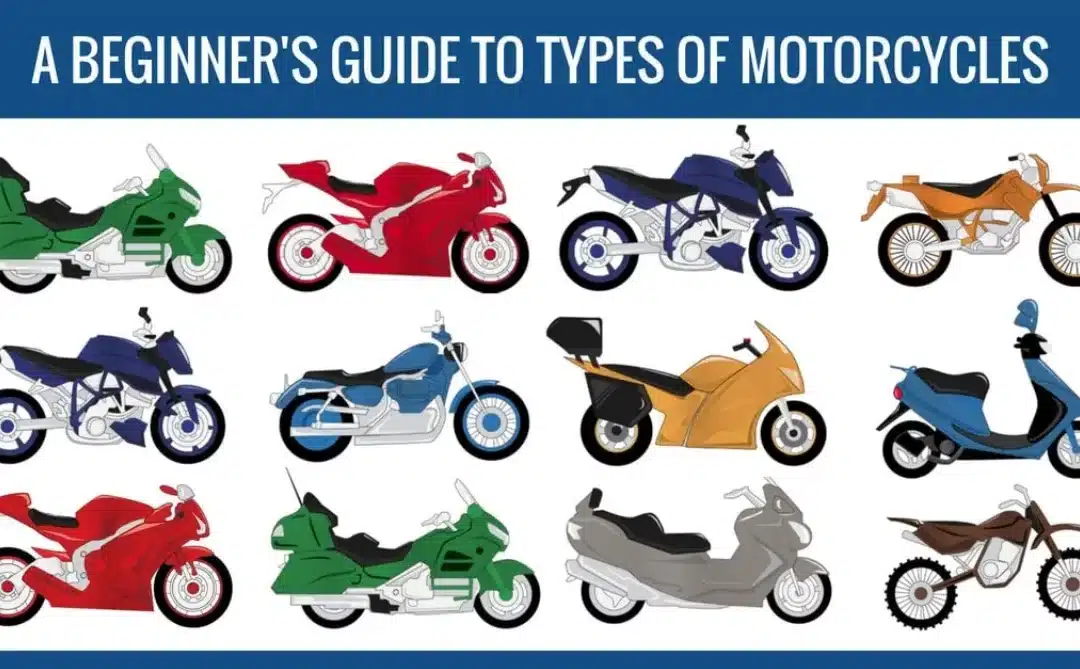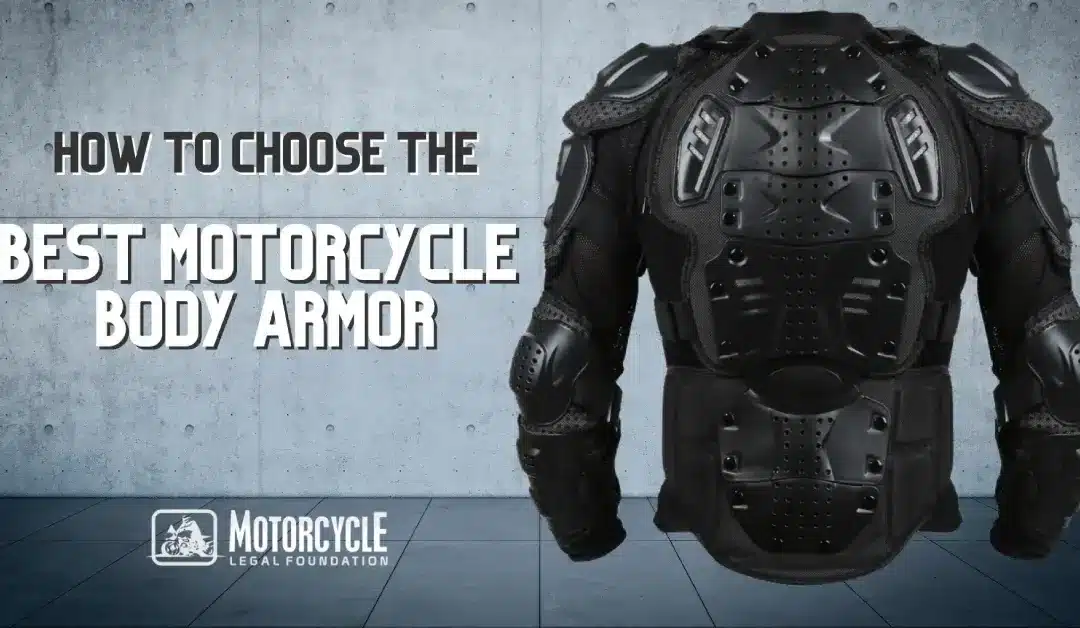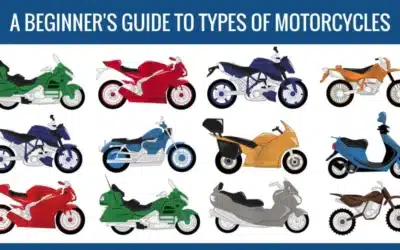How to Winterize Your Motorycycle
1. Change Your Motorcycle Fluids
2. Check Your Coolant/Anti-freeze
3. Wash Your Motorcycle
4. Lubricate Every Moving Part
5. Protect Your Leather
6. Stabilize Your Gasoline
7. Prepare Your Engine
8. Plug Up Your Exhaust
9. Store Your Battery
10. Select a Protective Environment
11. Prevent Flat Spots on Your Tires
12. Do Not Start Your Motorcycle Periodically
Wrap Up
Have you avoided more dangers on the road due to its slippery conditions caused by wet weather? Has daylight-savings caused you to shorten your ride or imposed on your commute home in the darkness? Or has the temperature dropped significantly lower to the point where you become a human popsicle by the time you reach your destination?
When the winter season encroaches upon us, it is time to consider placing your motorcycle into storage until the weather returns to its warm, sunny days. Take the following measures to winterize your motorcycle so that you’ll have it readily available to ride the following season.
How to Winterize Your Motorcycle
All oils break down over time, so the contaminants in the oil can produce condensation in their designated compartments. The condensation can then cause surface rust to form, which can cause corrosion on the metal parts. Before you put your motorcycle into storage, change the engine oil and filter so that you have fresh oil with no contaminants in the engine while in storage.
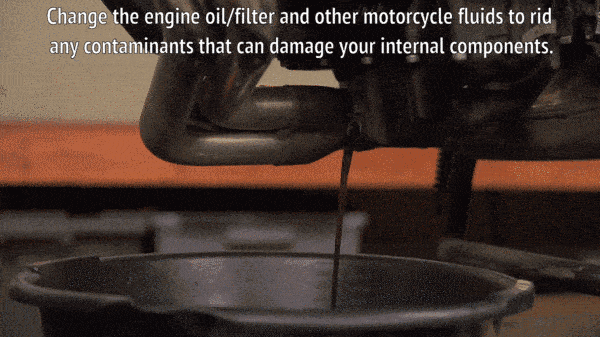
Video courtesy of Motorcyclist Magazine
If your motorcycle has a liquid cooling system, check that the engine coolant, also known as antifreeze, is in good condition with a hygrometer and that it’s topped off to its maximum level. Replace the antifreeze if necessary. This will prevent any water inside the cooling system from turning into ice and oxygen from corroding the interiors walls that are not covered with coolant.
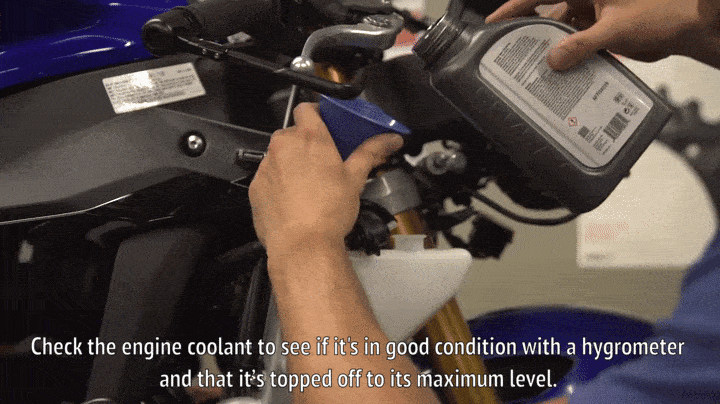
Video courtesy of Motorcyclist Magazine
Before you put your motorcycle into storage, give it a thorough wash to remove bugs and road grime. Use an automotive or motorcycle-specific detergent with a simple sponge or wash mitt to make your ride sparkle, and then dry with a chamois to prevent water spotting. Clean and/or polish all metal and plastic as needed or preferred.
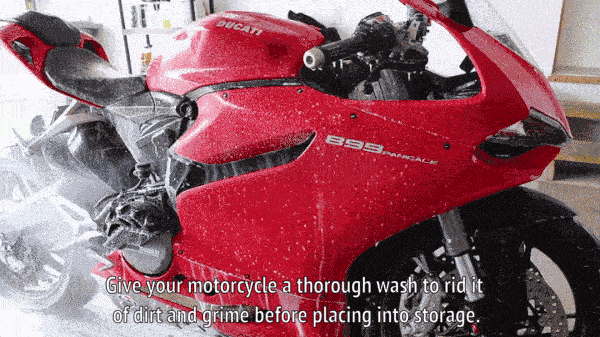
Video courtesy of Canadian Rider
Winter tends to bring moisture and stagnant air that will do their best to corrode any unprotected metal. Items like the fork tubes, drive chain, driveshaft, and other exposed metal should be lubricated appropriately. Use a chain lubricant specifically for the chain, but most of the other parts can be covered in a light coating of machining oil or WD-40. If you’re applying the coating with a spray applicator, consider applying it first to a lint-free cloth or towel and wiping it on. Spraying can accidentally cover other parts of the motorcycle (such as the fairing and painted items), which can cause a negative reaction to the coating.
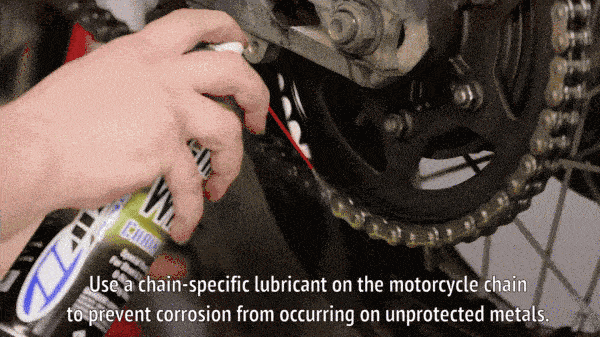
Video courtesy of RevZilla
Clean your leather parts, including your seats, grips, and saddle bags with a leather-safe soap and then wipe down with a leather protectant once they’re dry from the wash. This will maximize the lifespan of those parts and keep them in pristine condition.
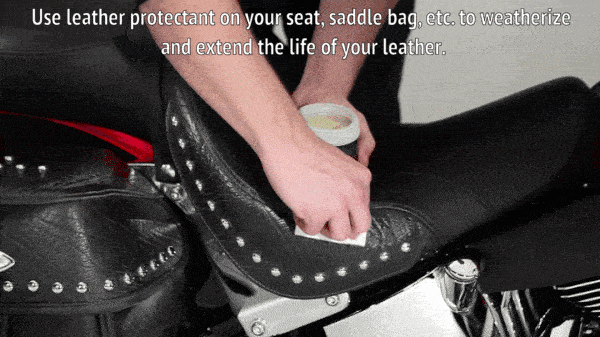
Video courtesy of Gateway Harley-Davidson
Gasoline will become stale overtime and lose some of the volatility due to the additives. Add a stabilizer to the gasoline for maximum quality control. Follow the recommended quantity for the duration of time you intend on storing the bike. Add the stabilizer to a full tank of gas and mix thoroughly.
Once mixed, run the motorcycle for a short period of time to ensure the stabilized gasoline has made its way to the carburetors or fuel injectors to protect them during storage. Make sure you turn off the petcock from your gas tank. If your motorcycle has carburetors, you’ll want to drain them to remove the gasoline out of them. No extra work is needed for fuel injectors.
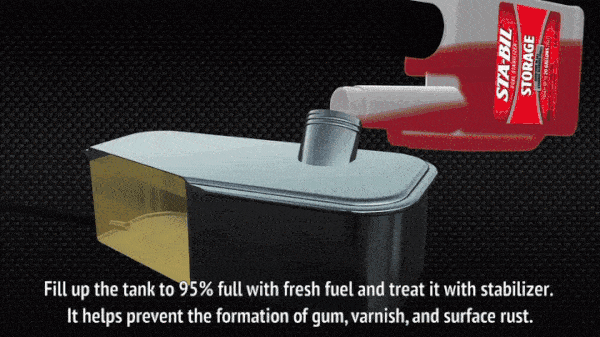
Video courtesy of GoldEagleCo
When the cylinders in your engine do not have a protective coating of oil or other fluids, it can cause corrosion over the storage period. Remove your spark plugs and squirt a small amount (about a teaspoon) into each cylinder. Ensure the spark plug wires will not arc out on any adjacent metal, and use the starter to spin the engine over a few times (typically less than 10 seconds of rotation).
This technique will help spread the oil in the cylinder and coat the surface evenly. Be mindful that oil may emerge from the spark plug hole as you spin the engine. Once completed, clean up any excreted oils, clean or replace the plugs and check their gap, and install them back into the engine.
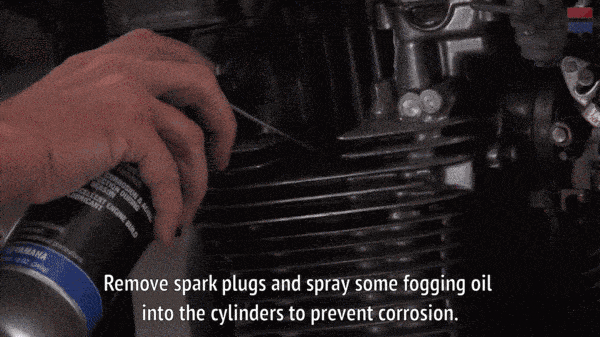
Video courtesy of Car and Driver Magazine
As the weather gets colder, rodents and mice will seek shelter in small hiding spaces for warmth, including inside exhaust pipes and air filters. Keep them out of your bike by plugging up the openings of your exhaust pipe with either steel wool or plastic bags— just be sure to remove them when you’re ready for your first ride of the season!
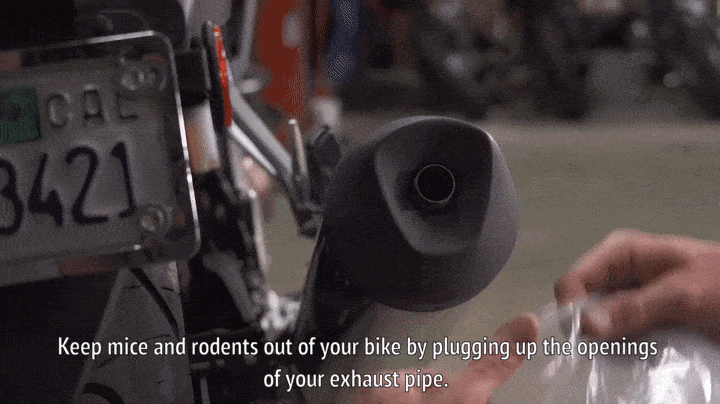
Video Courtesy of Motorcyclist Magazine
Depending on length of time that you keep your motorcycle in storage, your battery will require a bit of preventative maintenance to ensure it’s prepared for the next riding season. If you plan to leave it in your motorcycle, you can connect it to a battery tender that will keep the battery at full power while in storage.
Clean the terminals before connecting the charger and ensure it has a good connection. If you plan to remove your battery from your motorcycle, it is best to store it in a dry environment. Clean the terminals and apply Vaseline to them to keep them from rusting during storage.
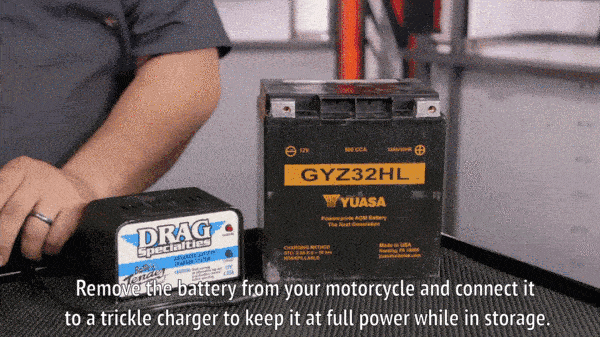
Video courtesy of RevZilla
There are numerous advantages to keeping your motorcycle stored in an enclosed space versus storing it outdoors: limited opportunity for animals or pests to make a nest in an available opening, less chance for water to drip or spray onto your freshly clean ride, and less temperature fluctuations are benefits of storing your bike indoors.
Ensure the motorcycle is kept away from electric motors, refrigerators, freezers, etc., as they will emit an ozone gas that will deteriorate rubber parts in their vicinity. Use a breathable cover for the motorcycle to keep it clean and void of moisture and dust. If you’re storing the motorcycle on concrete, lay down a piece of plywood, cardboard, or carpet to prevent condensation from forming. Lastly, be aware of the security of your motorcycle if left unattended while it’s in storage. Make sure your investment will be there when you’re ready to ride again.
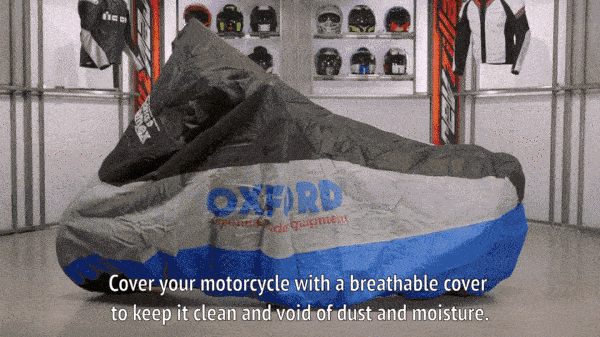
Video courtesy of RevZilla
Leaving your motorcycle parked on the tires for an extended period of time can cause the rubber to take a setting due to the constant weight, resulting in a flat spot to form. Place your motorcycle on a center stand (if your motorcycle is equipped with one) and/or blocking.
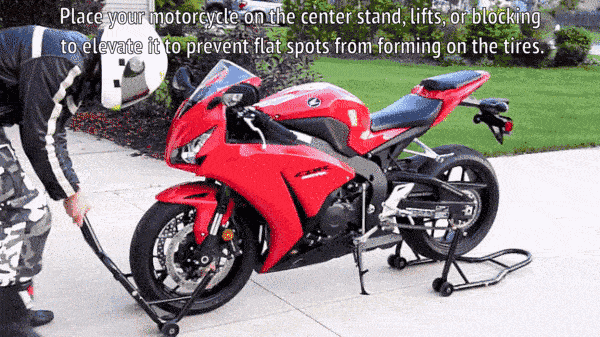
Video courtesy of CycleCruza
It’s a common misconception to run your motorcycle from time to time during the winter season. However, doing so as it can create condensation in the engine and exhaust system if it’s not at optimal temperature, causing more damages to come riding season.
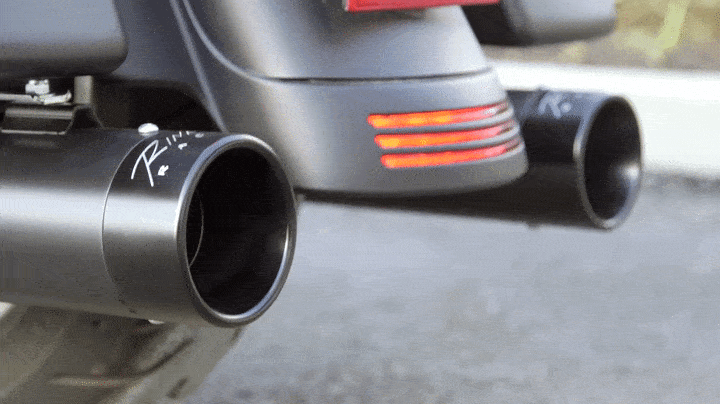
Video courtesy of Revzilla
Wrap Up
Preparing your motorcycle for storage is a simple exercise of cleaning, lubricating, and stabilizing parts that will only take a short time to complete. Taking these preventative measures will earn you a big payback come next riding season when your motorcycle is immediately ready to go.

